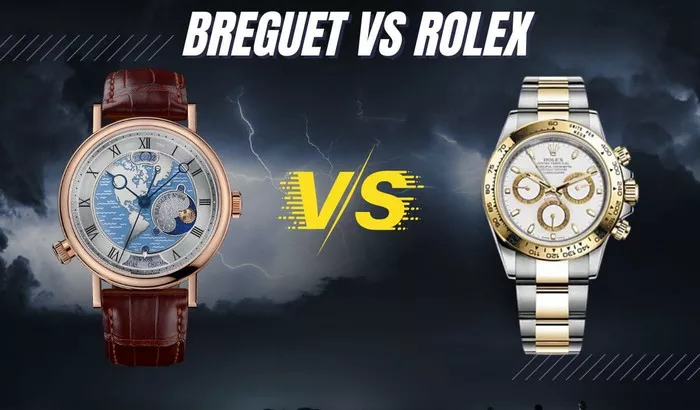In the illustrious realm of luxury watches, the debate surrounding Breguet and Rolex is a conversation steeped in tradition, craftsmanship, and individual preferences. Both brands, synonymous with horological prowess, cater to discerning enthusiasts with distinct philosophies. This article embarks on a comprehensive exploration, dissecting the attributes that define Breguet and Rolex, ultimately unraveling the question: Is Breguet better than Rolex?
1. Breguet: A Legacy of Elegance and Innovation
Heritage, Artistry, and Technical Mastery
Rich Historical Tapestry:
Breguet, founded in 1775 by Abraham-Louis Breguet, boasts a heritage that spans centuries. The brand is revered for its pioneering contributions to watchmaking, including the invention of the tourbillon, the Breguet balance spring, and other technical innovations that have left an indelible mark on the industry.
Exquisite Craftsmanship:
Breguet watches are celebrated for their exquisite craftsmanship, often characterized by guilloché dials, Breguet hands, and distinct coin-edge cases. The brand’s commitment to artistic detailing and technical precision positions it as a stalwart in the world of haute horlogerie.
2. Rolex: Enduring Legacy and Widespread Recognition
Innovation, Robustness, and Iconic Status
Pioneer of Modern Watchmaking:
Rolex, founded in 1905, is a trailblazer in the world of modern watchmaking. The brand introduced innovations such as the Oyster case, the first waterproof wristwatch, and the Perpetual rotor for self-winding movements. Rolex watches are lauded for their robustness, functionality, and enduring appeal.
Cultural Icon:
Rolex has transcended the confines of watchmaking to become a cultural icon. The brand’s association with exploration, adventure, and success has contributed to its widespread recognition. Iconic models like the Submariner, Daytona, and GMT-Master are coveted by enthusiasts worldwide.
3. Craftsmanship and Materials: The Art of Watchmaking
Materials, Precision, and Aesthetic Appeal
Breguet Craftsmanship:
Breguet watches are characterized by meticulous attention to detail and handcraftsmanship. The brand utilizes precious materials, including gold and platinum, and often incorporates intricate engraving and guilloché patterns on the dials. Breguet’s commitment to precision extends to its technical innovations, ensuring each watch meets the highest standards of accuracy.
Rolex Engineering Excellence:
Rolex watches are renowned for their robust engineering and durability. The use of high-quality materials, including the corrosion-resistant 904L stainless steel, contributes to the ruggedness of Rolex timepieces. The brand’s dedication to precision is reflected in its Superlative Chronometer certification, ensuring accuracy beyond industry standards.
4. Complications and Innovation: A Technical Perspective
Technical Mastery and Innovative Features
Breguet Complications:
Breguet has a legacy of introducing groundbreaking complications, including the aforementioned tourbillon, the Breguet overcoil, and the Pare-chute shock protection system. The brand continues to push the boundaries of technical innovation with each new release, appealing to connoisseurs who appreciate horological complexity.
Rolex Innovation:
While Rolex is not traditionally associated with highly complex complications, the brand excels in practical innovations. The Oyster case, the first waterproof case, and the Perpetual rotor for self-winding movements are testament to Rolex’s commitment to functionality and reliability.
5. Pricing and Exclusivity: The Value Proposition
Positioning in the Luxury Watch Market
Breguet Pricing:
Breguet watches are positioned at the upper echelons of the luxury watch market. The brand’s commitment to handcraftsmanship, technical mastery, and limited production runs contribute to the exclusivity and pricing of Breguet timepieces.
Rolex Pricing:
While Rolex is also positioned as a luxury brand, it tends to offer a wider range of price points, making it more accessible to a broader audience. Certain Rolex models, especially those with precious materials or intricate designs, can reach higher price ranges, but the brand’s lineup includes options that cater to varying budgets.
6. Collectibility and Investment Value: A Consideration for Enthusiasts
Horological Treasures and Resale Potential
Breguet Collectibility:
Breguet watches, with their historical significance and technical innovations, are highly coveted by collectors. Limited production and the brand’s enduring legacy contribute to the collectibility of Breguet timepieces, often making them sought-after investments.
Rolex Collectibility:
Rolex watches, known for their enduring popularity and cultural significance, also exhibit strong collectibility. Certain vintage Rolex models, limited editions, and iconic references have proven to be sound investments in the secondary market.
Conclusion: A Matter of Personal Preference
Choosing Between Elegance and Endurance
The question of whether Breguet is better than Rolex, or vice versa, is inherently subjective and depends on individual preferences, values, and the aspects of watchmaking that hold significance for the enthusiast. Breguet represents a tradition of elegance, artistic detailing, and technical mastery, appealing to those who seek a blend of horological history and refinement. Rolex, on the other hand, embodies enduring innovation, robustness, and an iconic status that resonates with a broader audience.
Ultimately, the choice between Breguet and Rolex is a deeply personal one, guided by an appreciation for heritage, craftsmanship, and the intangible allure of wearing a piece of horological history on one’s wrist. Whether adorned with a Breguet or a Rolex, the wearer is enveloped in a legacy of horological excellence, each brand offering a distinct narrative within the intricate tapestry of luxury watchmaking.

